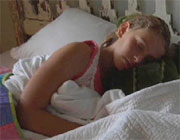- Recognizing the Signs of Hypothyroidism
- 10 Strategies to Overcome Insomnia
- Could Artificial Sweeteners Be Aging the Brain Faster?
- Techniques for Soothing Your Nervous System
- Does the Water in Your House Smell Funny? Here’s Why
- Can a Daily Dose of Apple Cider Vinegar Actually Aid Weight Loss?
- 6 Health Beverages That Can Actually Spike Your Blood Sugar
- Treatment Options for Social Anxiety Disorder
- Understanding the Connection Between Anxiety and Depression
- How Daily Prunes Can Influence Cholesterol and Inflammation
Extra Shuteye on Weekends May Not Replace Sleep Lost During Week


FRIDAY, Oct. 11Think you can just make up for those late nights by catching extra shuteye on Saturday morning?
Don’t count on it, say researchers who report that sleeping in on weekends doesn’t entirely restore the sleep you lost during the week.
For the study, researchers placed 30 volunteers on a sleep schedule that replicated a sleep-deprived workweek followed by a weekend with extra “recovery” sleep. The participants’ health and performance was tested at various times during this schedule.
The participants’ levels of sleepiness increased significantly when they got too little sleep, but returned to normal levels after recovery sleep. Levels of inflammation in the body also increased significantly when the volunteers were sleep deprived, and returned to normal after recovery sleep, the findings showed.
In addition, levels of a stress-related hormone did not increase during sleep restriction, but were much lower after recovery sleep, the investigators pointed out in a news release from the American Physiological Society.
However, the participants’ performance on a test that measured their ability to pay attention declined significantly when they got too little sleep and did not improve after recovery sleep.
This suggests that recovery sleep over just a single weekend may not reverse all the negative effects of sleep lost during the workweek, said Alexandros Vgontzas, of the Penn State University College of Medicine, and colleagues.
“Two nights of extended recovery sleep may not be sufficient to overcome behavioral alertness deficits resulting from mild sleep restriction,” the study authors wrote. “This may have important implications for people with safety-critical professions, such as health care workers, as well as transportation system employees (drivers, pilots, etc.).”
Although these findings provide some insight into the health effects of a single week of sleep loss and recovery, repeating this cycle over and over again may have more of a health impact.
“The long-term effects of a repeated sleep restriction/sleep recovery weekly cycle in humans remains unknown,” the researchers said.
The study was published in the Oct. 1 issue of the American Journal of Physiology-Endocrinology and Metabolism.
More information
The U.S. Centers for Disease Control and Prevention has more about sleep and sleep disorders.
Source: HealthDay
Copyright © 2026 HealthDay. All rights reserved.










